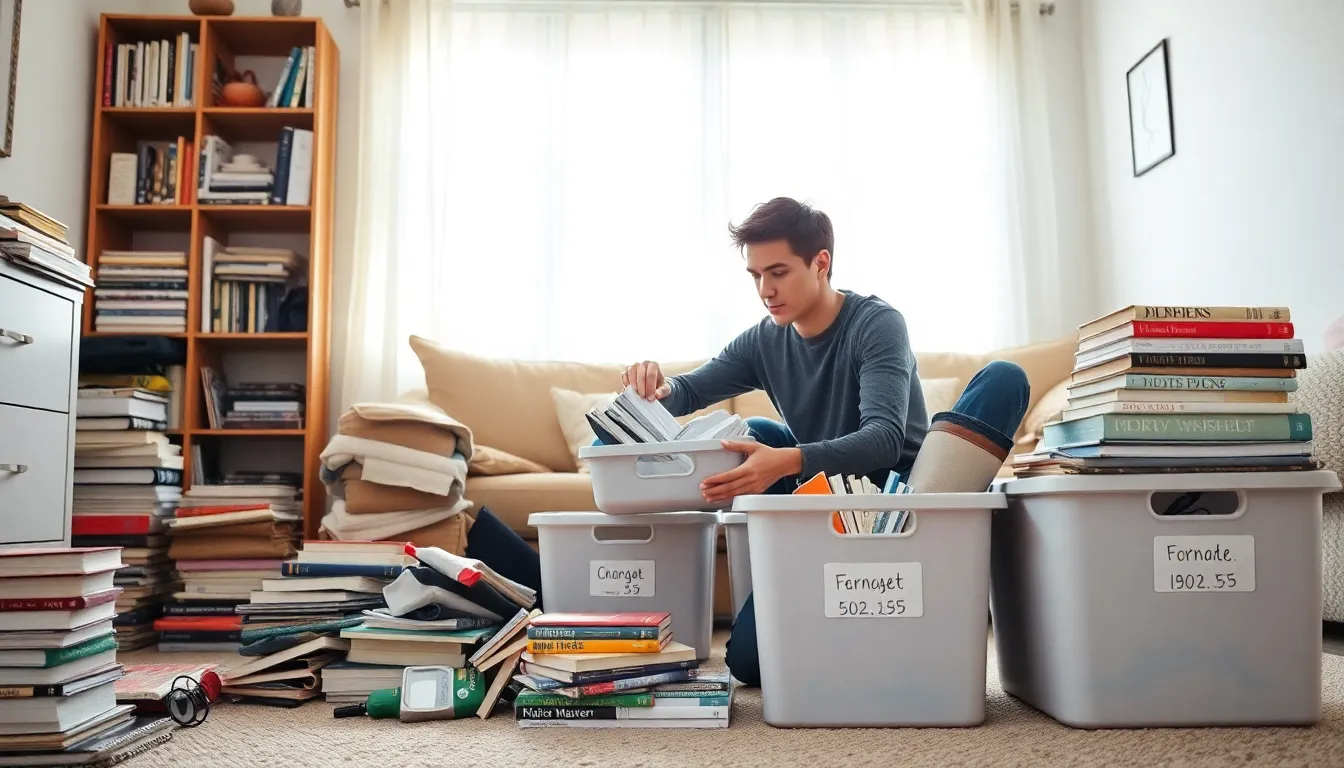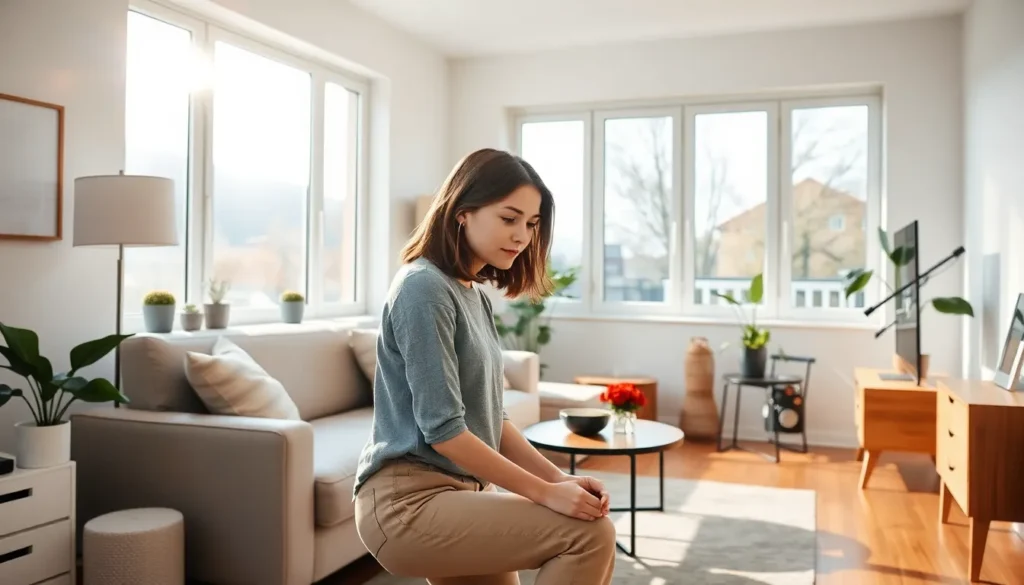Table of Contents
ToggleImagine stepping into your home and feeling an instant wave of calm wash over you. No more tripping over shoes or wading through a sea of mismatched socks. Clutter-free living isn’t just a trend; it’s a lifestyle that promises not only a tidier space but also a clearer mind.
Understanding Clutter-Free Living
Clutter-free living creates a peaceful environment that promotes mental clarity. This approach fosters an organized space, reflecting a more intentional lifestyle.
Definition and Importance
Clutter-free living refers to maintaining an organized environment devoid of unnecessary items. This lifestyle emphasizes the importance of simplicity and mindfulness. Prioritizing essential belongings enhances one’s ability to focus on what truly matters. A clear space leads to a calm mind, reducing stress and distractions. Recognizing the difference between want and need allows individuals to let go of surplus possessions.
Benefits of Clutter-Free Living
Clutter-free living offers numerous advantages for individuals and their well-being. Increased productivity often results from reduced distractions. It enables individuals to locate items quickly, saving valuable time. Enhanced creativity can occur in organized surroundings, allowing the mind to explore new ideas. Maintaining a tidy space promotes better mental health, leading to lower anxiety levels. A simplified environment makes it easier to embrace stress-free habits.
Steps to Achieve Clutter-Free Living

Achieving a clutter-free lifestyle requires intentional actions and thoughtful strategies. Focus on specific steps that lead to a more organized and serene environment.
Assessing Your Space
Evaluate each room systematically. Identify areas filled with unnecessary items or clutter. Think about functionality; rooms should serve their intended purpose effectively. Assess the use of furniture, decor, and storage solutions. Prioritize spaces that impact daily life the most, such as kitchens and living areas. Evaluate your storage capacity; maximize it with strategic organization techniques. Decide what items truly bring value and joy. Create a list of areas needing attention to maintain focus.
Decluttering Strategies
Implement effective decluttering strategies. Start small by designating specific areas or categories to tackle. Use the “one-in, one-out” rule to manage incoming items and minimize accumulation. Establish a timeline for regular decluttering sessions, such as weekly or monthly. Donate or sell items in good condition; this benefits others while clearing space. Use storage bins and labels to maintain organization long-term. Create a designated space for important documents, ensuring they stay accessible. Review and refine these strategies regularly for continued success.
Maintaining a Clutter-Free Lifestyle
Maintaining a clutter-free lifestyle requires intentional daily habits and effective tools. These strategies empower individuals to sustain their organized environments.
Daily Habits for Success
Starting each day with a 10-minute tidy-up can make a significant difference. Making the bed sets a positive tone for the day. Returning items to their designated places immediately prevents clutter accumulation. Implementing a routine for sorting mail immediately reduces paperwork chaos. Adopting the practice of evaluating purchases based on necessity fosters mindful consumption. Prioritizing moments for decluttering, such as before bedtime, enhances long-term organization. Regularly assessing belongings ensures the environment remains functional and aligned with personal values.
Tools and Resources
Utilizing storage bins helps categorize and simplify organization. Labeling systems clarify contents and streamline access, making it easier to maintain order. Online inventory apps track possessions and provide a clear overview of items, assisting in decluttering efforts. Donation services offer pickups, simplifying the process of parting with unnecessary belongings. Minimalist planners support individuals in setting and tracking decluttering goals, guiding progress. Seeking inspiration from online blogs or social media groups connects individuals with a community of like-minded individuals. Each of these resources contributes to a sustainable, clutter-free lifestyle.
The Psychological Impact of Clutter-Free Living
Clutter-free living significantly influences mental well-being. An organized environment fosters calmness and reduces overwhelming feelings.
Reducing Stress and Anxiety
Clutter contributes to heightened stress levels. An organized space alleviates feelings of chaos, promoting relaxation. Decluttered environments provide clarity, allowing for a more serene atmosphere. Individuals often experience diminished anxiety when surrounded by simplicity. Psychological studies indicate that neat settings enhance one’s emotional state, leading to improved mood. Simplifying surroundings creates a sanctuary for mental peace, positively impacting overall health.
Enhancing Focus and Productivity
Focus improves in a tidy space. Clear work areas minimize distractions, helping individuals concentrate on tasks. Organized environments encourage efficient workflows, making it easier to accomplish goals. Research shows that cluttered spaces hinder productivity, often leading to frustration. When everything has its place, managing time and energy becomes more straightforward. Individuals find that decluttering invites creativity and problem-solving, ultimately facilitating greater achievements.
Embracing clutter-free living transforms not just physical spaces but also mental landscapes. By fostering an environment of simplicity and mindfulness, individuals can experience heightened focus and reduced stress. The actionable strategies outlined empower anyone to take control of their surroundings and cultivate a serene home.
Maintaining a clutter-free lifestyle requires ongoing commitment and daily habits that promote organization. With intentional practices in place, the benefits of a tidy space extend far beyond aesthetics, contributing to overall well-being and productivity. As individuals embark on this journey, they’ll find that a clutter-free environment leads to a more intentional and fulfilling life.




